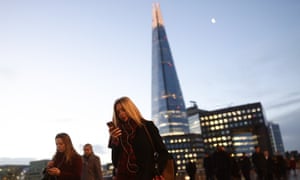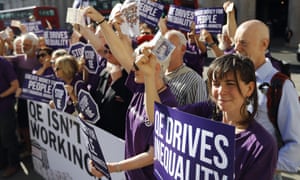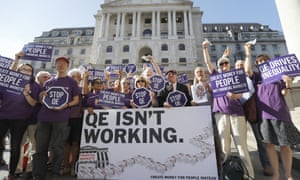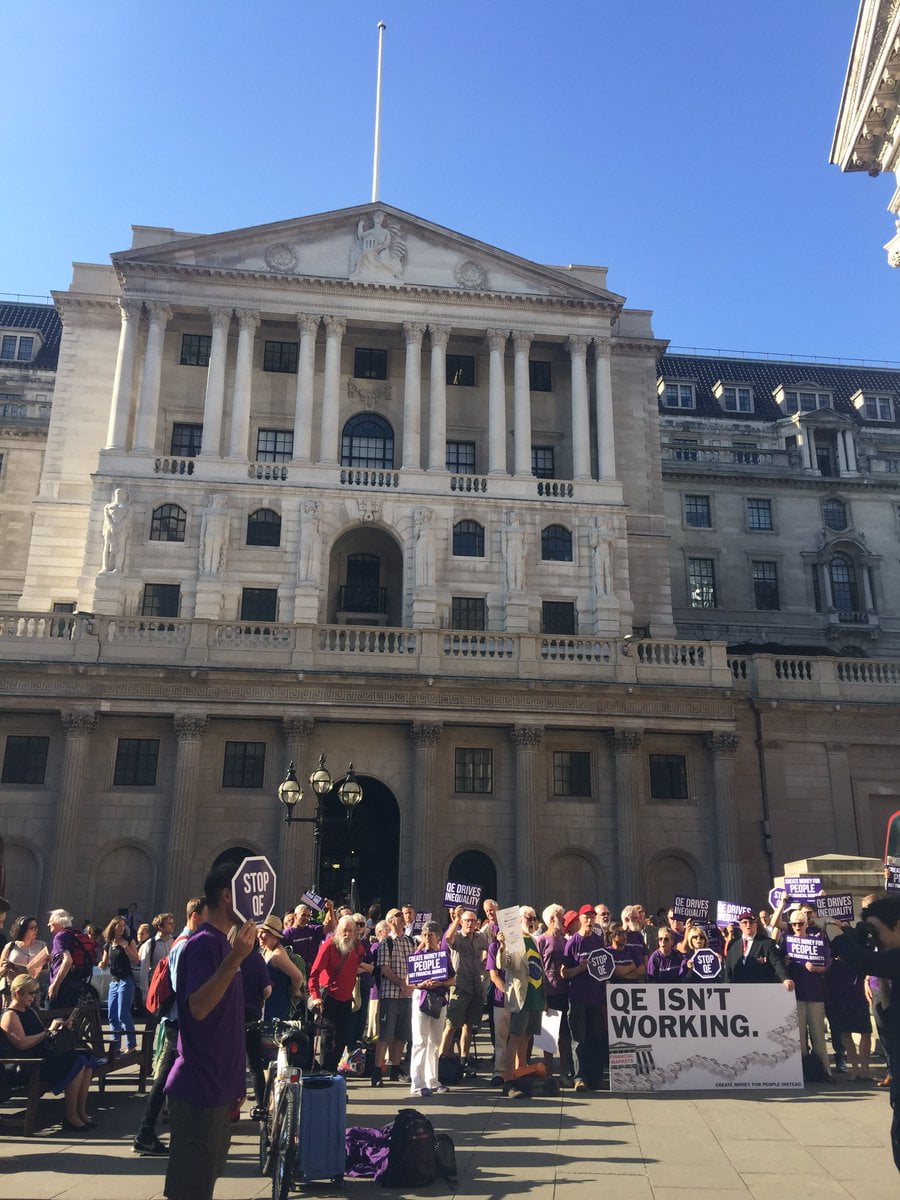
Table of Contents
ToggleEuropean shares close lower
A number of disappointing company results – from brewer Carlsberg, Austrian brickmaker Wienerberger and insurer Admiral – helped send stock markets into negative territory. Investors were also nervous ahead of the latest US Federal Reserve minutes, and what they might hint about the course of interest rates, as well as the continuing uncertainty over the fallout from the Brexit vote. The final scores showed:
- The FTSE 100 finished down 34.77 points or 0.5% at 6859.15
- Germany’s Dax dropped 1.3% to 10,537.67
- France’s Cac closed 0.96% lower at 4417.68
- Italy’s FTSE MIB fell 1.58% to 16,528.36
- Spain’s Ibex ended down 1.56% at 8487.0
- In Greece, the Athens market lost 0.86% to 567.49
On Wall Street, the Dow Jones Industrial Average is currently down 23 points or 0.12%.
On that note, it’s time to close for the evening. Thanks for all your comments, and we’ll be back tomorrow.
Here are some more pictures of the protest against the Bank of England’s quantitative easing programme.


A protest against the Bank of England’s quantitative easing programme is taking place in London at the moment. Organised by protest group Positive Money, it wants the bank to implement other measures rather than QE, which it believes just benefits financial markets.
— Jill Ward (@jillianfward)August 17, 2016
QE protest on outside the BOE now – “invest in the economy, not financial markets”
The pound has slipped back to below its pre-jobs data level against the dollar.
It is currently down 0.26% at $1.3012, having earlier climbed as high as $1.3070. Against the euro, sterling is down 0.15% at €1.1548.
Markets are taking a bit of a dip ahead of the US Federal Reservemeeting, despite oil prices holding up after the US data.
But investors also have the UK jobs data and the uncertainty of the Brexit negotiations on their minds. Joshua Mahony, market analyst at IG, said:
There is a certain degree of trepidation in the markets today, with indices selling off sharply in anticipation of the minutes of the Federal Open Market Committee’s last meeting, due out this evening. The July FOMC meeting took place after market fears had subsided in the wake of the UK’s referendum on EU membership, with the statement citing diminished near-term risks. If the committee no longer believes external factors are worth worrying about, then a 2016 rate hike is a distinct possibility. Given that much of the post-referendum surge in stocks has come from dovish monetary policy implications, hawkish comments are likely to exacerbate the weakness we are already seeing for markets today.
Today’s UK jobs report is significant in the post-referendum world, with Brexiteer jeers ringing out as they use the figures to back their argument that the pro-remain camp was fear-mongering with its warnings over the impact on the economy. It is certainly too early to say how the UK economy will react to the referendum result and eventual Brexit from the EU, but today’s surprise decrease in July claimants suggests that businesses are waiting it out rather than making any rash judgements of the implications.
Comments from Germany’s European Affairs Minister hinting that the UK may be able to obtain a “special status” post-Brexit are an encouraging signal ahead of the exit negotiations. Once article 50 is enacted, any perceived developments within trade discussions are sure to be significant volatility drivers in the markets, raising the prospect of two years of unpredictability.
The number one concern within the city is whether the UK will retain passporting rights, and success on this issue could define whether negotiations are perceived as a success or failure within financial markets.
US crude stocks in surprise weekly drop
And now oil is recovering some ground after the US inventory figures showed an unexpected fall last week.
The Energy Information Administration said crude stocks dropped by 2.5m barrels compared to forecasts of a 522,000 increase. Gasoline stocks fell by 2.7m barrels, much higher than the expected 1.6m barrel drop.
— Trading Economics (@tEconomics)August 17, 2016
— FOREX.com (@FOREXcom)August 17, 2016
EIA reports US #crude oil inventories fell 2.5m barrels last week, more than expected and higher than API estimate (1m). #WTI oil jumps ^FR
Following the figures Brent crude is now in positive territory, up 0.1% at $49.28 a barrel while West Texas Intermediate – the US benchmark – is down 0.19% at $46.39, having earlier been as low as $45.84.
6h ago15:10
Ahead of the latest weekly US oil stocks report, Reuters is reporting that Saudi Arabia could boost its output in August to a new record of 10.8m to 10.9m barrels a day.
The news has pushed oil prices slightly lower, with Brent crude now down 0.35% at $49.06 a barrel.
Wall Street opens lower
As expected US markets have followed the example of Europe and slipped back in early trading.
But investors remain cautious ahead of the US Federal Reserveminutes due later. The Dow Jones Industrial Average is down 41 points or 0.22% while the S&P 500 and Nasdaq opened virtually flat.US markets are expected to open roughly flat as investors await the FOMC minutes from the July meeting later in the day.
— IGSquawk (@IGSquawk)August 17, 2016
US Opening Calls:#DOW 18537 -0.10%#SPX 2179 +0.06%#NASDAQ 4804
UK working age households are still £400 a year worse off than before the 2008 financial crisis according to Resolution Foundation.
The thinktank warns that a near “lost decade” in household incomes is in danger of being extended by a triple whammy of slower economic growth, higher inflation, and benefit cuts.
Resolution’s analysis of ONS figures found that working age households have been the ones to suffer.
Adam Corlett, economic analyst at Resolution Foundation:
Despite welcome income growth in 2015-16, the typical non-retired household remains some £400 a year worse-off than before the financial crisis of 2008.
We’re closing in on a lost decade for working-age households, which leaves the typical family around £8,500 a year poorer than would have been the case had we maintained pre-crisis levels of income growth.
The concern now is that lower income working-age households risk experiencing a ‘triple whammy’ of income recovery shocks as growth slows in the aftermath of the EU referendum vote, inflation picks up and cuts such as the four-year freeze on working-age benefits start to bite. This risks not only delaying the recovery for these families, but flipping it into reverse.
Gold prices have slipped following those hawkish comments from Fed policymakers William Dudley and Dennis Lockhart.
Both said a September interest rate rise was possible, sending spot gold down 0.2% at $1,343 an ounce, while US gold was down 0.6% at $1,348.60 an ounce. Rate rises tend to mean a stronger dollar, and a stronger dollar tends to signal weaker gold prices.
[Source: The guardian]




